Especially written for electronic devices,
Romanian verbs has an introduction to the formation of all verbal tenses in Romanian, as well as 100 essential verbs fully conjugated with their meaning. This book allows the user to search in all the text because it has no images or vanishing or unreadable text.

Editorial Karibdis
Romanian verbs
100 verbs series - Volume 7 First edition Karibdis 04.05.18 Original title:
Romanian verbs Editorial Karibdis, 2018 Cover design: Karina Martnez Ramrez Vector cover image: Creative_hat / Freepik Digital editor: Karibdis First edition: may 2018 All rights are reserved. No part of this book may be used or reproduced in any manner whatsoever without written permission. The unauthorized reproduction of this copyrighted work is illegal. No part of this book may be scanned, uploaded or distributed via the internet or any other means, electronic or print, without the publishers permission.
If you find any misprint, mistake or typo in this book and you want to communicate it to us, please write us at the following email: . We will be very pleased to receive your comments, doubts or other observations in order to make this book better.
ROMANIAN VERBS
1. Introduction
Romanian language belongs to the Romance languages like Spanish, Italian and French. The main features of the Romanian language are:
- mood: indicative, subjunctive, conditional, presumptive, imperative
- tense: present, past, future
- person: first, second, third
- number: singular, plural
- gender: masculine, feminine
- voice: active, passive, reflexive
2. Classification of verbs
Romanian verbs are divided into eleven conjugations, according to the ending of the infinitive and the suffixes:
- 1st conjugation: the infinitive ends in -a and has no suffix
- 2nd conjugation: the infinitive ends in -a and has the suffix -ez / -eaz-
- 3rd conjugation: the infinitive ends in - without suffix
- 4th conjugation: the infinitive ends in -i without suffix
- 5th conjugation: the infinitive ends in -i without suffix
- 6th conjugation: the infinitive ends in -i and has the suffix -esc / -et-
- 7th conjugation: the infinitive ends in - and has the suffix -sc / -t-
- 8th conjugation: the infinitive ends in -ea without suffix
- 9th conjugation: the infinitive ends in -e without suffix
- 10th conjugation: the infinitive ends in -e without suffix
- 11th conjugation: the infinitive ends in -e without suffix
3.1. First conjugation
The present indicative of the first conjugation is formed with the root of the verb plus the endings -, -
i, -, -
m, -
ai, -:
CNTA (sing) cnt cn-
i cnt cnt-
m cnt-
ai cnt
3.2. Second conjugation
The present indicative of the second conjugation is formed with the root of the verb plus the endings -
ez, -
ezi, -
eaz, -
m, -
ai, -
eaz:
DANSA (dance) dans-
ez dans-
ezi dans-
eaz dans-
m dans-
ai dans-
eaz3.3. Third conjugation
The present indicative of the third conjugation is formed with the root of the verb plus the endings -, -
i, -, -
m, -
i, -:
VR (enter) vr vr-
i vr vr-
m vr-
i vr
3.4. Fourth conjugation
The present indicative of the fourth conjugation is formed with the root of the verb plus the endings -, -
i, -, -
im, -
ii, -:
OFERI (offer) ofer ofer-
i ofer ofer-
im ofer-
ii ofer
3.5. Fifth conjugation
The present indicative of the fifth conjugation is formed with the root of the verb plus the endings -, -
i, -
e, -
im, -
ii, -:
DORMI (sleep) dorm dorm-
i doarm-
e dorm-
im dorm-
ii dorm
The present indicative of the sixth conjugation is formed with the root of the verb plus the endings -
esc, -
eti, -
ete, -
im, -
ii, -
esc:
GLUMI (joke) glum-
esc glum-
eti glum-
ete glum-
im glum-
ii glum-
esc3.7. Seventh conjugation
The present indicative of the seventh conjugation is formed with the root of the verb plus the endings -
sc, -
ti, -
te, -
m, -
i, -
sc:
HOTR (decide) hotr-
sc hotr-
ti hotr-
te hotr-
m hotr-
i hotr-
sc3.8. Eighth conjugation
The present indicative of the eighth conjugation is formed with the root of the verb plus the endings -, -
i, -
e, -
em, -
ei, -:
PREA (seem) par par-
i par-
e pr-
em pr-
ei par
3.9. Ninth conjugation
The present indicative of the ninth conjugation is formed with the root of the verb plus the endings -, -
i, -
e, -
em, -
ei, -:
NCEPE (begin) ncep ncep-
i ncep-
e ncep-
em ncep-
ei ncep
3.10. Tenth conjugation
The present indicative of the tenth conjugation is formed with the root of the verb plus the endings -, -
i, -
e, -
em, -
ei, -:
MERGE (go) merg merg-
i merg-
e merg-
em merg-
ei merg
3.11. Eleventh conjugation
The present indicative of the eleventh conjugation is formed with the root of the verb plus the endings -, -
i, -
e, -
em, -
ei, -:
RUPE (break) rup rup-
i rup-
e rup-
em rup-
ei rup
The compound past of indicative of all verbs is formed with the auxiliary verb

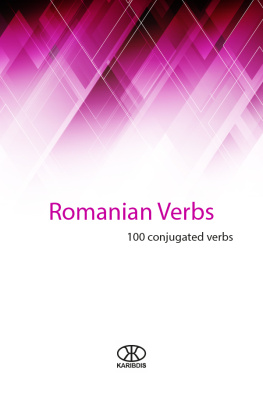

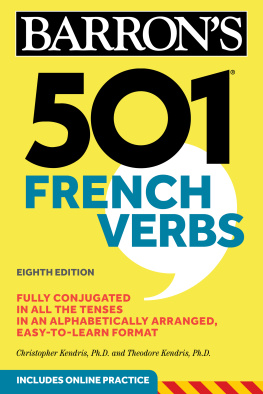

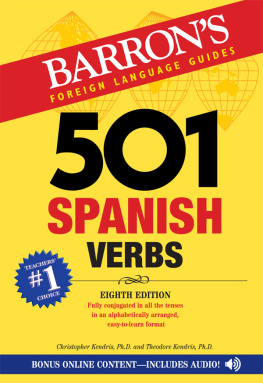
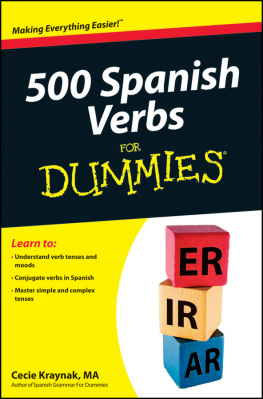



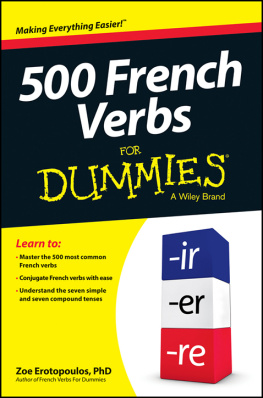

 Editorial Karibdis
Editorial Karibdis